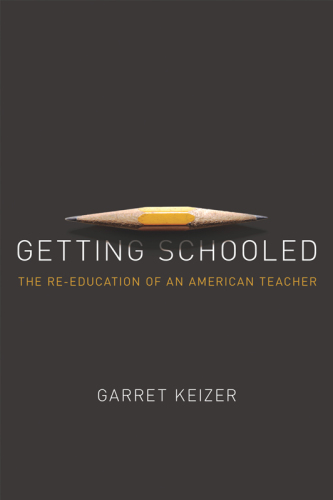
Getting Schooled
The Reeducation of an American Teacher
کتاب های مرتبط
- اطلاعات
- نقد و بررسی
- دیدگاه کاربران
نقد و بررسی

Starred review from March 31, 2014
This memoir by Harper’s contributing editor Keizer (Privacy), written entirely in the present tense and based on a 2011 Harper’s essay of the same title, is at once a sympathetic portrait of a school, a searing indictment of a culture that uses working-class children as cannon fodder, and, unexpectedly, a page-turner. Keizer, who left public school teaching 14 years ago to write full-time, returns to his former profession when his wife’s job situation changes and the couple needs health insurance. After a fruitless search for a university appointment, Keizer resumes his post in a high school English classroom in rural Vermont; the principal is one of his former students. He chronicles the difficulties teachers face, including the staggering amount of time they devote to using supposedly time-saving technology. Keizer also trenchantly analyzes the ways his students are pulled into the deadening culture of the capitalist marketplace, and the heroic efforts of small-farm families to survive in a landscape of agribusiness. The author depicts his colleagues and students with tough-minded admiration. At the end of the year, Keizer leaves the classroom to go back to his writing desk—a loss for the students he might have taught, but a gift to readers and left-leaning policy wonks who seek intelligent commentary on education. Jonathan Kozol fans will have a new favorite. Agent: Peter Matson, Sterling Lord Literistic.

Starred review from July 1, 2014
A high school teacher who became a full-time writer returns to the high school where he taught for years.Harper's contributor Keizer (Privacy, 2011, etc.) chronicles his return to teaching at a rural Vermont high school 14 years after his departure. One of Keizer's former students was now the principal, all the students now possessed smartphones, and teaching to the test was more common than before. Some phenomena had not changed, however: the motivated students, the indifferent students, the time-consuming lesson plans, the seemingly endless grading of essays, the individual crises of students at home and in the hallways, as well as the occasional classroom revolts that any teacher would have difficulty controlling. Keizer is a sometimes-sardonic, sometimes-maudlin, always entertaining guide to contemporary high school atmospherics. The paperwork he must complete about each student's performance led him to conclude that it has become increasingly difficult to teach the actual educational substance of what the paperwork indicates should be measured by the curriculum. Keizer explains that even if teaching conditions were closer to ideal, many of the students come from homes where nobody previously has graduated from high school; thus, a higher education will not carry much value in the minds of older rural Vermont residents. Even though he often hoped for the school year to end, Keizer felt devoted to each student, knowing that the schoolwork was providing the acculturation that students lacked at home. The author never romanticizes classroom teaching, and he skillfully compares his own admittedly challenging daily tasks to the even more difficult tasks willingly undertaken by his wife and his adult daughter, who teach special needs children. "It's fair to say that I have never gone to work in a school with what might be called purity of heart," writes the author, "though much of what I know about purity of heart I learned there."A well-written, yearlong chronicle packed with humor, pathos and valued insights on nearly every page.
COPYRIGHT(2014) Kirkus Reviews, ALL RIGHTS RESERVED.

July 1, 2014
After a 14-year hiatus from teaching at a Vermont public high school, Keizer, a 57-year-old successful journalist, returned there in 2010 for a single-year stint filling in for another teacher on sabbatical. In this expansion of an essay that appeared in the September 2011 issue of Harper's, Keizer recounts his eye-opening experiences getting schooled in how much the educational system had changed since he last faced a classroom. Keizer devotes one chapter to each month of his effort, from August to June, including the weeks of preparation and decompression that came before and after teaching approximately 80 teenagers from one of the poorest student populations in the state. Along with anecdotes about winning over his students in an era of ubiquitous Google searching and cell-phone texting, Keizer takes aim at some of the public school system's current shortcomings, such as low salaries and an overemphasis on testing scores. His brilliant writing and insights on much-needed educational reforms should attract the attention of parents, teachers, and school administrators and boards across the country.(Reprinted with permission of Booklist, copyright 2014, American Library Association.)

March 1, 2014
Keizer (Privacy) returned to the rural Vermont high school where he had taught 14 years ago to reassess, finally arguing that public education need not fail and that treating educational reform as a panacea for America's social ills is a big mistake.
Copyright 2014 Library Journal, LLC Used with permission.

























دیدگاه کاربران